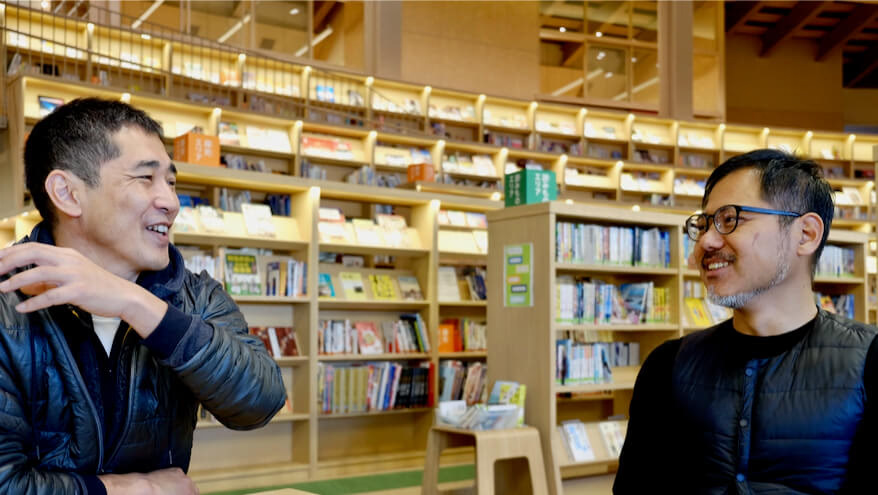We asked Naoki Iwase (nicknamed "Gori-san"), principal of Karuizawa Kazekoshi Gakuen, about his concerns as CEO of Monosus, Mr. Hayashi. In Part 1 , Gori-san explained his specific methodology for revving up Kazekoshi projects when they stalled, in response to the concerns that Monosus members had become less motivated due to working from home during the COVID-19 pandemic.
Mr. Hayashi was listening to Gori's advice and taking notes, and was constantly hitting his knee. This time, we will look deeper and find the key to the fundamental solution.
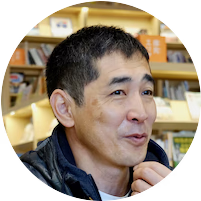
Naoki Iwase (Gori) :
Principal of Karuizawa Kazakoshi Gakuen. With 22 years of experience as a public elementary school teacher, he is working to create student-centered lessons, classes, and schools. He usually wanders around the school. He loves seeing children with books in their hands.
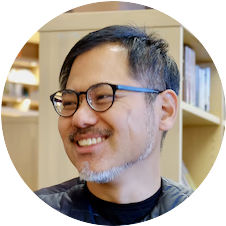
Takahiro Hayashi :
Representative of Monosus. Moved to Karuizawa in April 2020, just before Kazakoshi opened. Lives in the Kazakoshi community with his wife and two daughters who attend Kazakoshi. In addition to cooking, his hobbies include bonfires and DIY.
The major discovery was that "feedback seen in the same context is received."
Hayashi: As I mentioned earlier ( see previous article ), the methodology of having someone tune across projects is a great idea, but it can be a nuisance from the project perspective. In a company, it would be like having an executive show up to a unit's project, but it requires preparation and reduces the productivity of the original work. It also means more meetings, so I was worried people would dislike it.
Iwase: For now, I try not to join meetings because when I do, I end up wanting to say a lot of things (laughs).
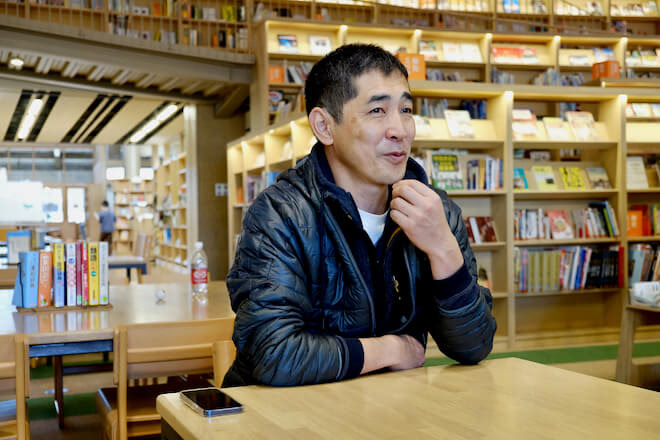
Everyone: (laughs).
Iwase: I've been working in schools for a long time, so I can see a lot of things. There are endless ideas for things to be done differently.
Hayashi: Infinitely (laughs).
Iwase: That obviously lowers the morale of the staff. I had been thinking for a long time, "Why does it lower morale?" and finally an answer came to mind. It's a difference in context.
Hayashi: It's a difference in context.
Iwase: We seem to be looking at the same thing, but we're not. The other person has their own way of seeing things, and I have my own way of seeing things. Because I give feedback based on my own context, the other person doesn't get it, or doesn't understand it. It was often the case that it was taken as a formality, like "Gori-san told me to do it, so it must be a good thing," and there was no enthusiasm for incorporating it.
Ikeda: It's so realistic.
Iwase: I finally realized that this gap often exists. We currently have three interns at Kazekoshi, and they write reflections every day, and I also give them feedback every day for three months.
Hayashi: Yes, yes.
Iwase: As an intern, she records what happens and writes down what she thinks. I also give her lots of feedback in the form of questions about what she writes, like, "Was there anything else I could have done at that time?" or "Looking back at it now, how does this scene look?" That way, it gets through to her. Reflections are written in a person's context. I read the world as they saw it, so we're seeing the same thing. That's why it's easy to get through to them.
Hayashi: Ooooh!!
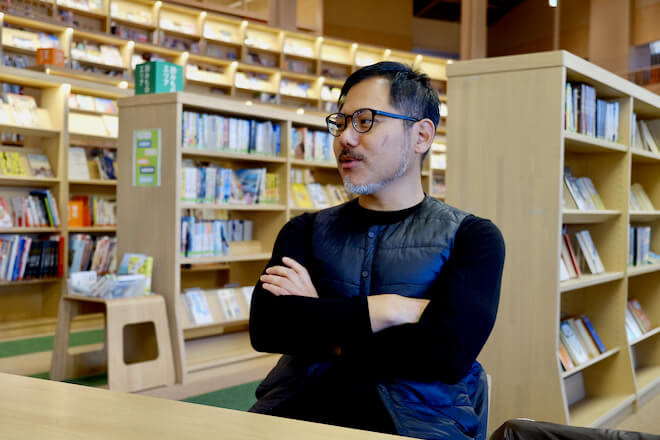
Iwase: This is an overwhelming difference. It was a major discovery for me.
Hayashi: A discovery!
Iwase: I gave her feedback, asking, "Are activity and exploration the same thing? What's the difference?" and at one point she thought, "Ah, this is exploration! So what can I do to support this?" and it became the energy that helped her grow.
But if I had given feedback from my own perspective like, "That's just supporting the activity, not exploring it," I think they'd probably be disappointed (laughs).
Hayashi: I'm nervous (laughs).
Iwase: I realized that I've made a lot of mistakes.
"A culture of mutual feedback" and "a culture of collaborative tuning"
Hayashi: I'm sorry for asking such a silly question after hearing such a great story, but I think it's a bit of an exercise in authority to say, "Let's start doing this now," a reflection that hasn't been part of the system up until now.
Iwase: Yes, I think I was able to do that because I was an intern. I told them to write every day because they were here to grow. But the benefits of reflection can only be seen after the fact, so it can be difficult to start.
Hayashi: The earlier discussion about project documentation was also akin to looking back.
Iwase: Yes, it's close. My ulterior motive is to create a culture where people naturally give feedback and criticize each other. Because I'm the "person of authority" here, my feedback carries a lot of weight. It's easy to take it as an evaluation rather than a critique.
Ideally, it would circulate among close people. I'm really thinking about how to create a common understanding that "exchanging criticism leads to our own growth and the improvement of the project."
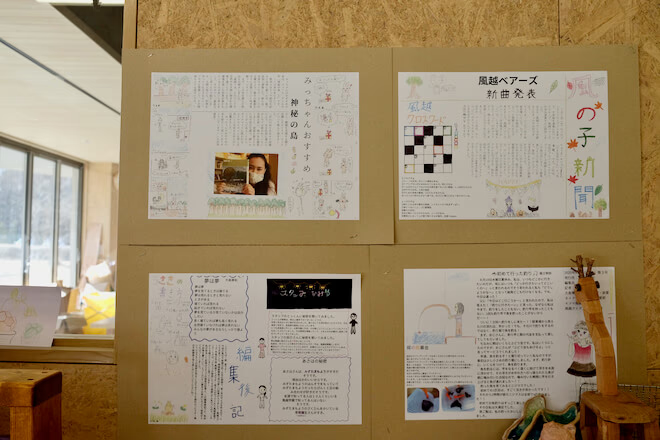
Iwase: I feel like this idea is starting to sink in with the children, and after they finish their presentations on Project Output Day (a place where they can show the results of their learning), they always ask for feedback.
Hayashi: My daughter also said to me for the first time, "Come see, Daddy." I'm shy and not really that type of person, but she clearly expressed her desire for me to come and see.
Iwase: Yes, yes. Another thing is that I want to create a "culture of tuning."
Staff who are "strong in art" or "strong in libraries" are resources, so we make it easier for them to connect so that they can fully utilize each other. When designing a project or reviewing it, I think it will make a big difference if various people are involved and can tune each other.
Is consulting-like involvement the key to making the most of your own resources?
Hayashi: I had a similar experience to Iwase-san. A long time ago, I had an exchange diary with a member named Sakamoto-chan. He would send emails by midnight, and I would always reply by 10am the next morning. I think we did that for about a year and a half, and at that time I read his stories, so I felt like they were clearly reaching him. But when I went to a project review meeting and commented, it still didn't work. I couldn't get through, so I stopped participating.
Iwase: But surely there are things that only you can see, Mr. Hayashi? Those must be extremely valuable resources. I wonder how we should handle that kind of value.
Hayashi: I wonder if that's the answer... Consulting projects for clients work well. It's completely from my own perspective, but it reaches the customer. One reason for this is that the customer has a need for me to be involved and they are willing to pay me.
Also, when consulting, you communicate your perspective according to the other person's thought process and style. If you think about it that way, the problem may be mostly on our side.
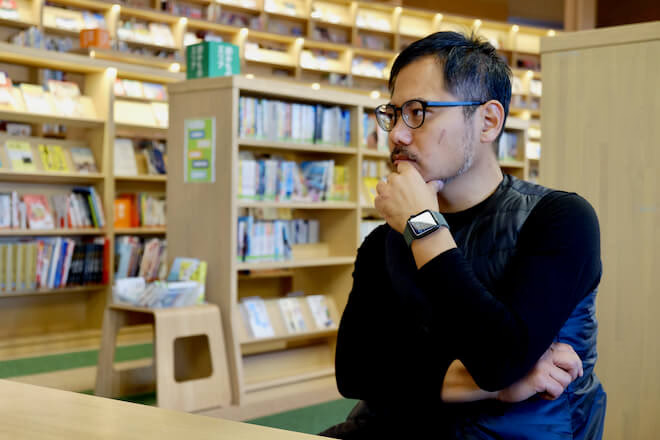
Iwase: That's true. I also think whether or not there is a conflict of interest plays a big role. When I go into a school as a consultant, it always goes well. I have no direct conflict of interest, and I can only give feedback based on the information I hear, so it's hard for anything unnecessary to happen.
But here, there are so many conflicts of interest with each staff member that it's hard to get your message across directly. They can see all sorts of things, like "Maybe it's an evaluation" or "Maybe it's a comparison with others," so the more you try, the worse it gets.
Hayashi: I think that if you're too close, you end up acting like an evaluator. What else?
Iwase: That's true... I think it's more polite when you come in from the outside. You have to choose your words carefully and time is limited, so you have to think about what to say and how to say it.
Hayashi: That's true. When giving feedback to colleagues or family, there are times when we don't say it in the first person. We have a strong sense that it's the other person's job. But when consulting, it's my job, so if it doesn't go well, the feedback comes back to me.
Iwase: I see.
Hayashi: I guess that's where politeness gets lost. There's no sense of responsibility for what you say, and you say, "The rest is your job."
Iwase: That's why it's hard for the other party to feel like they're being "accompanied" like a consultant.
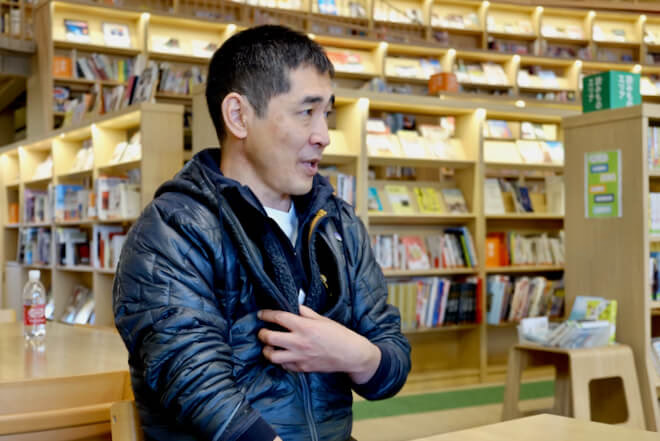
Hayashi: My relationship with Food Hub may be like that of a consultant in a sense. Whenever they have trouble making a decision, they come to me for advice, and I feel like they use me as a resource.
Sugimoto : Isn't it because it feels like you're looking at it from the outside?
Hayashi: They are mainly working behind the scenes to raise funds and make adjustments with the parent company's executives, and they are completely letting go. They are treating it without any ulterior motives. ...So that's how it reaches them!
Iwase: The staff of teams where learning and projects are going well are not in front of the children as evaluators. They are having fun together and exploring together, and it's going really well, and the adults seem to enjoy it too. But if you get involved as an evaluator, it quickly becomes cold. Even if the adults are doing it unconsciously, the children will say, "I'm here to keep an eye on them."
Hayashi: I see.
Iwase: That kind of thing happens beautifully in the world of children. I think the essence of it may be similar for adults too.
(End of conversation)
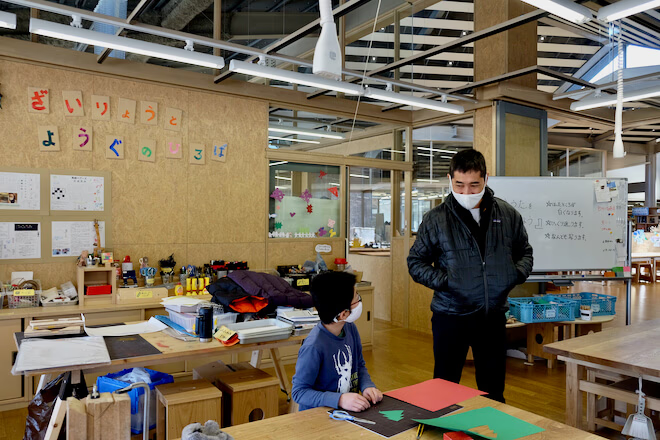
If you are the head of an organization, you may have felt the frustration of not receiving feedback at least once.
As a mother of two, I felt that there were similarities between parent-child interactions as I listened to the talk. As a parent, I wonder if I speak to my children in a different context than they do, or if I am acting as an "evaluator"... There were times when I looked back on my own situation and felt a knot in my stomach (bitter smile).
The next episode will be the last one. Will we find a fundamental solution? The exploration of "how to handle freedom" continues!
